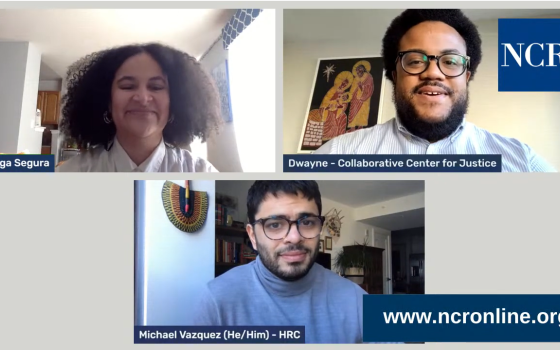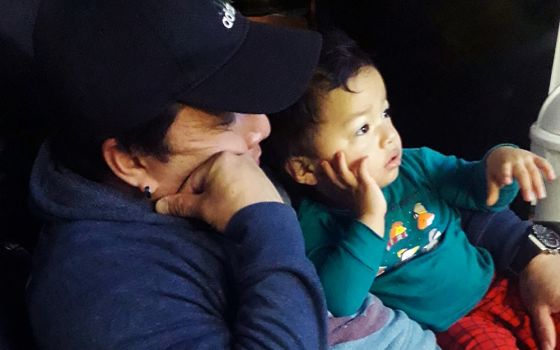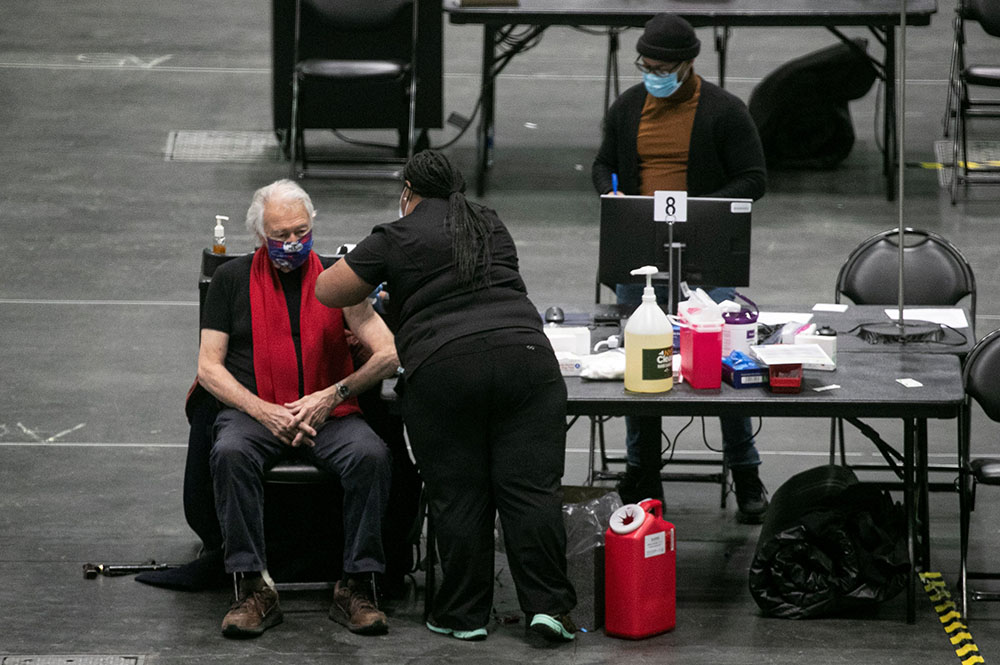
A man at the New York state COVID-19 vaccination site, the Jacob K. Javits Convention Center in New York City, receives a dose of the coronavirus vaccine Jan. 13. (CNS/Reuters/Brendan McDermid)
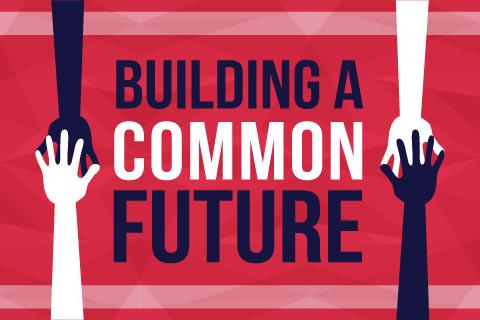
(NCR graphic/Toni-Ann Ortiz)
Editor's note: In the weeks preceding the inauguration of the country's second Catholic president, National Catholic Reporter asked Catholic politicians, activists and scholars to offer advice to President-elect Joe Biden in a series that takes its title from Pope Francis' encyclical Fratelli Tutti: "Building a Common Future."
2020 was a year marked by great division in our country. Political division. Racial division. Economic division. In this New Year, we must find ways to overcome the obstacles that divide us. In America, we are better when we focus on what unites us rather than what pulls us apart. We must measure our collective success by ensuring that those who are in need or who are suffering are lifted up by those who have enjoyed an abundance of success and opportunities.
We must be a country dedicated to the common good.
My understanding of the common good is rooted in my faith in God — that all things will work toward his greater good. The Catholic teachings of family, community and participation mean upholding our moral principles and always striving to care for those who have less. The common good must be based upon a solid foundation of justice for all. Justice cannot abide the anguish that millions of seniors, parents and children face in the midst of the greatest public health crisis our nation has seen in more than a century.
In December, Congress passed the $900 billion COVID-19 aid legislation into law (Public Law 116-260), bringing urgently needed relief to unemployed workers, to families who cannot afford to eat, to teachers and students and to many more Americans. But this legislation is only a starting point. In this new Congress, as we welcome President Joe Biden to the White House, we must do more.
In this horrible pandemic, we lost mothers, fathers, sisters, brothers, neighbors and friends. We also lost doctors, nurses, teachers, grocery store clerks, public transit workers and other heroes who risked their lives on the front lines of the public health crisis.
One Pennsylvanian who lost his life to COVID-19 was Walter Rasich. Walter was a devoted father of four, a beloved grandfather of eight and a great-grandfather of seven. Some of Walter's favorite pastimes were working in the garage and hunting and fishing with his children, grandchildren and great-grandchildren. Walter was a widower and retired after working 42 years as an electrical inspector for the steel industry.
Advertisement
Walter was a resident of a long-term care facility when he died. Such facilities have been hardest hit by the pandemic. More than 133,000 residents and workers in long-term care settings have lost their lives to COVID-19, making up 37% of deaths nationwide. This profound loss of life is an American tragedy within the broader tragedy of this pandemic.
Walter's facility locked down when the pandemic hit and his family was no longer allowed to visit. On Monday, April 20, 2020, Walter's family received a call that he was going to the hospital with a fever of 102. Four days later, Walter died.
Walter Rasich deserved better. We must do more to protect seniors and workers in long-term care settings.
Since the beginning of the pandemic, I have been fighting for policies to save lives in nursing homes. We must ensure that nursing homes have all the personal protective equipment and testing they need and that vaccinations in long-term care settings proceed quickly and efficiently. We must provide resources to implement best practices in infection control and to support the heroes on the front lines with adequate pay, benefits and leave.
We must bring more accountability and oversight to nursing homes that consistently fall short, and we must invest in the long-term services and supports that allow people to receive care at home, which is where most Americans prefer to be. I won't stop fighting for these solutions, because that's what Walter deserves. It's what those more than 133,000 Americans deserve.
The hundreds of thousands of lives lost to COVID-19 are not the only tragedy from this pandemic. Widespread unemployment is exacerbating what were already the undeniable realities of hunger, poverty and food insecurity in this country. The Supplemental Nutrition Assistance Program (SNAP) is a lifeline for millions of Americans to access the food they need to survive.
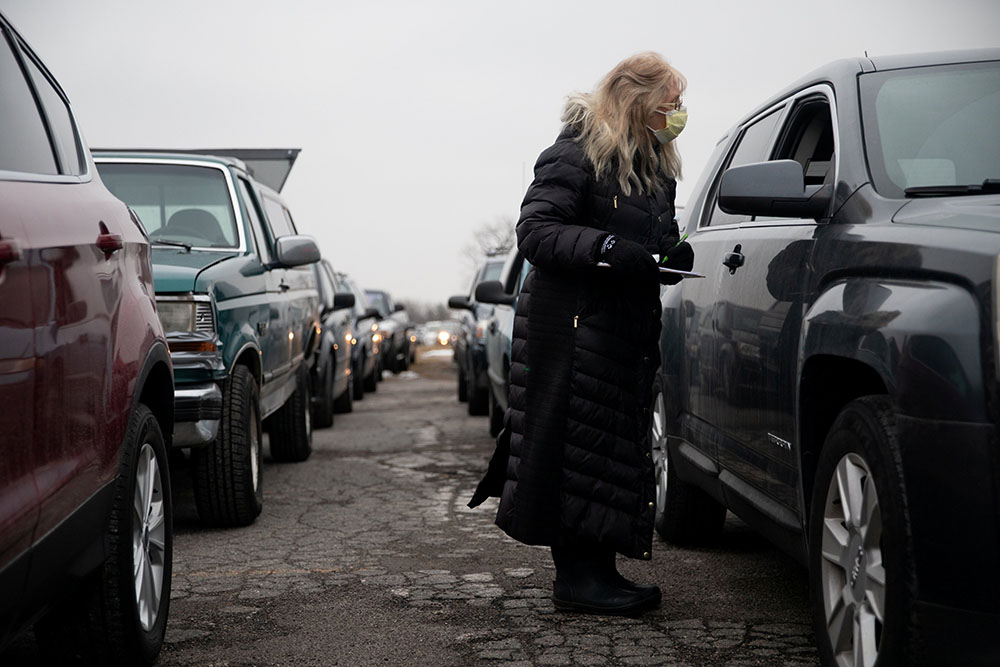
A volunteer from Forgotten Harvest food bank in Warren, Michigan, checks cars before a mobile food pantry distribution Dec. 21, 2020, amid the coronavirus pandemic. (CNS/Reuters/Emily Elconin)
As Americans continue to struggle in the face of Depression-era unemployment rates, it is our moral responsibility to guarantee freedom from hunger. We are the most prosperous nation the world has ever known. No one should go hungry. Every individual has a right to not live in fear about where or how they will receive their next meal. In addition to helping feed families, SNAP also plays a critical role in supporting and stabilizing our economy. For every SNAP dollar spent, income is generated for those involved in producing, transporting and marketing the food and other goods purchased by SNAP recipients.
The most recent relief bill includes a 15% increase in the minimum benefits level for the next six months. It also includes $5 million in funding to expand the availability of delivery options for SNAP participants.
These and other critical nutrition assistance provisions included in the relief bill are a start, but we must do more. We must work to continue to provide hunger relief that responds to the severity and longevity of the economic crisis and ensure that all families receiving SNAP benefits can safely access food with delivery and pickup options that are necessary during this public health crisis.
It was unacceptable, even before the pandemic, that SNAP participants did not have access to delivery options to safely access the food they need. It is even more critical now — for seniors, for immunocompromised individuals, for individuals with disabilities and for families who lack access to reliable transportation. We must ensure that these families can stay home and stay safe.
Adequate support for nursing homes and home- and community-based care as well as funding for SNAP are just two of the ways that we can care for those among us who are suffering during this difficult time. We must also promote the common good by providing additional support for small businesses, rent relief and eviction moratoriums.
We must always seek the common good for the most vulnerable among us: children, the poor, people with disabilities, older Americans and others at risk, especially in this time of crisis and suffering.




